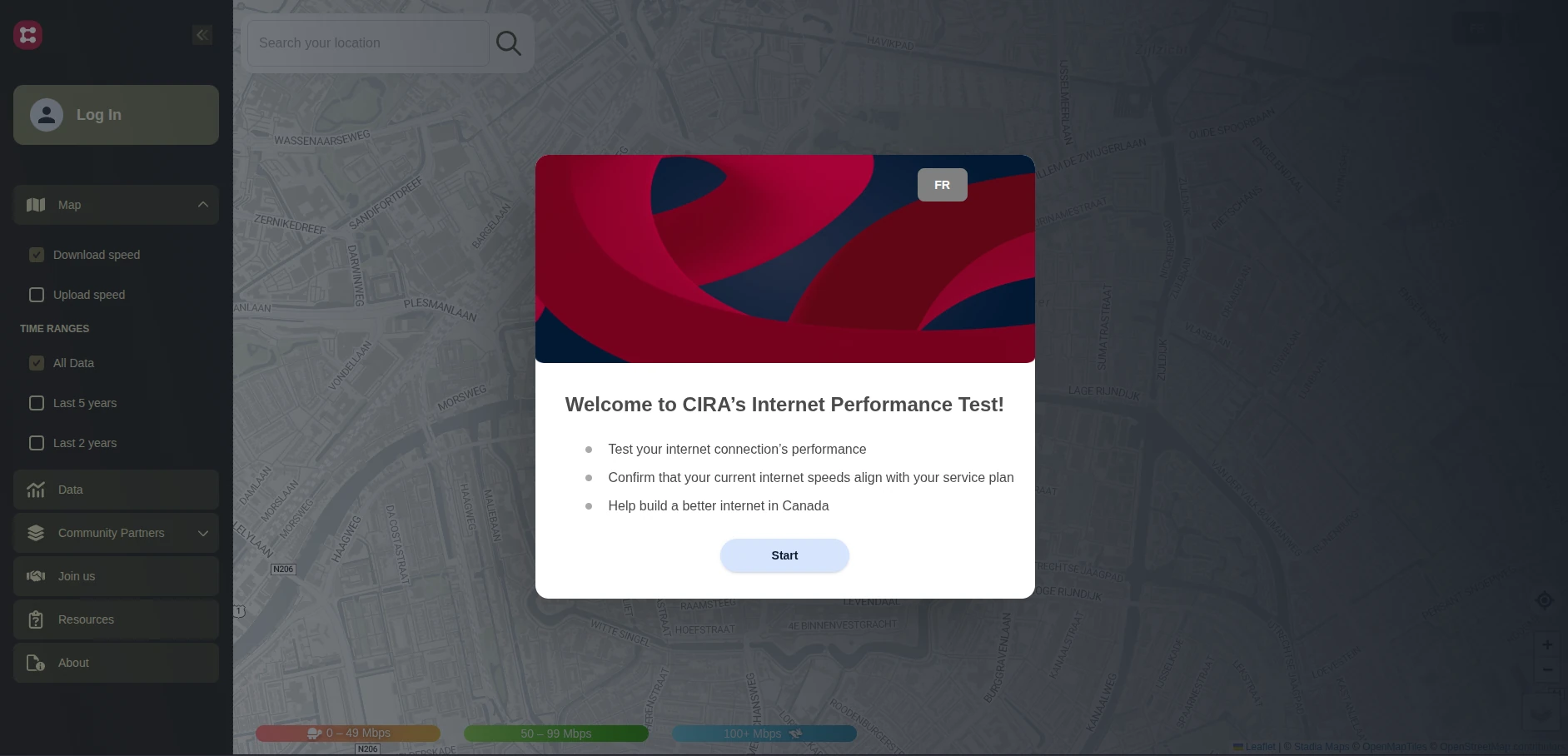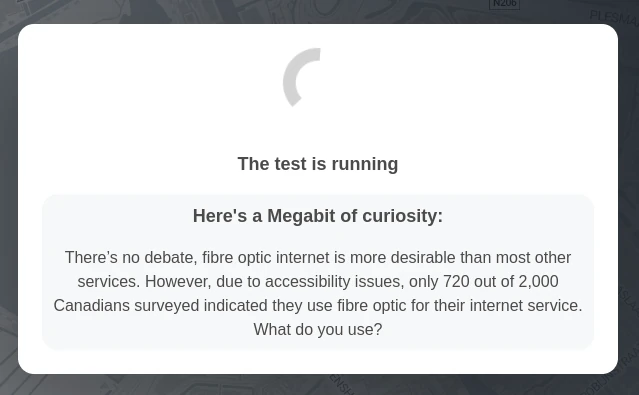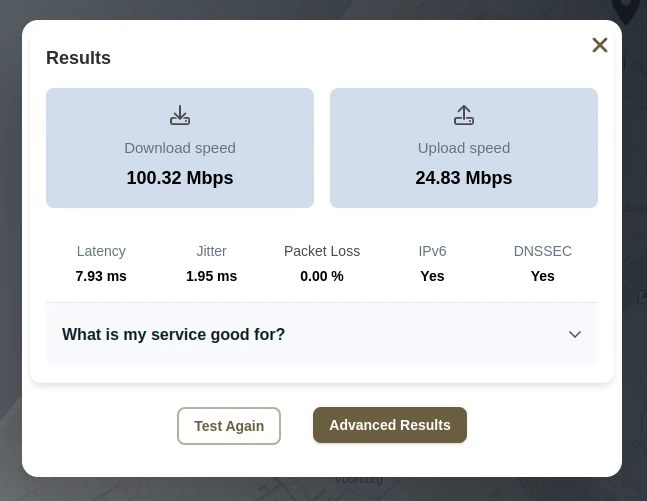https://performance.cira.ca CIRA's Internet Performance Test 0 4/5 stars ★★★★☆ Hans van der Graaf Hans van der Graaf
In general, CIRA's Internet Performance Test is a recommended speed test, mainly because this speed test is accurate and relative fast.
- Data efficiency: 76/100
- Time to complete: 88/100
- Security: 91/100
- Privacy friendly: 35/100
- Usability: 50/100
- Accessibility: 67/100
- Informative: 20/100
With an adverstised speed of 100 Mbps and an average measured internet speed of 100.1 Mbps, we conclude that CIRA's Internet Performance Test is an accurate speed test (Accuracy score: 99/100).
CIRA's Internet Performance Test is a mainstream speed test. That is, this speed test measures the advertised speed.
CIRA's Internet Performance Test is owned by the Canadian Internet Registration Authority. The first occurence on the Wayback Machine is from May 2015.
 The speed test is available in English and French. As a background, the map of your supposed location is shown in grayscale.
The speed test is available in English and French. As a background, the map of your supposed location is shown in grayscale.
CIRA uses ESRI's ArcGIS Geocoding API, a third-party API used to locate civic (street addresses) on a map.
Megabits of curiosity
When the speed test runs, there is no progress indicator. Instead "A megabit of curiosity" is shown.

There are 18 "Megabits of curiosity". When the speed test is running one of the following facts are shown (release 5.1.1 - June 18, 2025):
- When the World Wide Web launched in 1993, dial-up was limited to 56 Kbps via phone line connections. Today, 94.8% of Canadian households have internet speed of at least 50 Mbps download and 10 Mbps upload. That's more than 1000x faster!
- Over the last 12 months, the median download speed of people running tests in Canada is 89.1 Mbps and the median upload speed is 23.14 Mbps. How do your results compare?
- With a fibre optic connection, you could download a two-hour HD movie in about the same time it takes to complete this test. Many Canadian cities have these extensive networks in place, and efforts are being made to extend them to underserved areas.
- You may think internet providers offer unlimited data plans in Canada, but it's not quite nationwide. Data caps still exist, especially in rural areas where users exceeding their cap experience reduced speeds or additional charges.
- No one likes being the star of one of those awkward freeze frames on a virtual call but unfortunately, this is a major issue for users in remote areas due to Canada's vast geography. To thaw out, check out your latency number in the results - the lower the better!
- Data is broken down into little "chunks" called packets and are sent to and from devices on the internet. Sometimes packets get lost along the way and need to be re-transmitted. When many packets get lost, applications become pixelated and glitchy or may not work at all. The lower the packet loss number, the better.
- People refer to the swing dance as the jitter, but jitter is also part of the internet. It's the variance in the delay of when packets swing from their source and arrive at their destination. This impacts real time applications, like gaming and video conferencing the most.
- The Universal Broadband Fund, launched by the Canadian government, aims to connect 98% of Canadians to high-speed internet by 2026 and 100% by 2030.
- Need another reason to hate winter storms? Snow and ice can majorly impact internet infrastructure, leading to outages, reduced performance and challenging network building conditions.
- The Internet of Things (IoT) refers to any device, often everyday objects like thermostats and doorbells that can connect to the internet. Did you know the first IoT device was the ATM?
- A recent survey conducted by CIRA discovered the average Canadian spends 5+ hours online per day either using email, social media, or online banking. How do you spend your time?
- In a recent survey conducted by CIRA, 46% of respondents reported having unlimited data as part of their home internet package in 2024, which is up from 29% in 2016.
- There's no debate, fibre optic internet is more desirable than most other services. However, due to accessibility issues, only 720 out of 2,000 Canadians surveyed indicated they use fibre optic for their internet service. What do you use?
- A recent survey conducted by CIRA found that two-in-ten Canadians (20%) indicate that they experienced a major disruption to their home internet in 2023.
- Are you up to date? These test results let you know if your internet service provider (ISP) supports IPv6, the latest internet protocol that holds up nearly an infinite number of IP addresses. IPv6 is needed now more than ever with billions of devices and IoT connected to the internet.
- DNS stands for the Domain Name System. It converts the numbers that computers speak into the words that humans speak. CIRA is the registry for all of Canada's .CA domains!
- Why not stretch your legs while you wait to see if your ISP supports the latest DNS Security Extensions (DNSSEC)?
- Similar to the good ol' "Who's the best hockey team?" debate, there's a significant divide in internet speed across Canada, particularly in more rural areas. Data from these tests helps to identify those underserved regions.
After the "Megabits of Curiosity" wait screen, the results are displayed as follows:

CIRA's Internet Performance Test is based on the M-Lab speed test.
Pros
This CIRA speed test has the following pros:
- It is accurate
- It is available in English and French
- There is a neat background map with your (supposed) location
Cons
This CIRA speed test has the following cons:
- There is no progress indicator
- It takes some effort to start the speed test because your location is first determined and you have to indicate that the location is correct
When to use CIRA
If you are a Canadian or want to use a French speed test, then this is an excellent speed test.
How we tested
We have tested CIRA's Internet Performance Test in a standardized way. This makes speed tests easy to compare.
The following results form the basis for this speed test review:
- Abort/pause possible: no
- Ad-free: yes
- Average download speed of 3 measurements: 100.1 Mbps
- Clear indication of the current focus: yes
- Correct back button behavior: yes
- Flesch Reading Ease score of the privacy policy: 32.47
- Number of ACheckers known problems: 3
- Number of cookies: 11
- Number of measured features: 3
- Number of Wave errors: 2
- Observatory score: 30
- Tingtun score: - (didn't work while testing)
- Total data use of 3 measurements: 475 MiBs
- Total time to complete 3 tests: 70.2 seconds